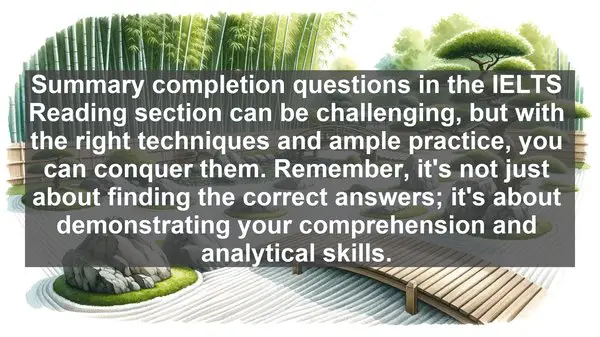Introduction: The Importance of Summary Completion Questions
In the IELTS Reading section, summary completion questions play a crucial role. They not only test your understanding of the passage but also assess your ability to identify key information and summarize it effectively. Today, I’ll be sharing the top 10 techniques that can help you tackle these questions with confidence.
1. Skim the Passage First
Before diving into the questions, it’s essential to skim through the passage. This gives you a general idea of the content, making it easier to locate specific information later. Pay attention to headings, subheadings, and any highlighted keywords.
2. Understand the Context
To answer summary completion questions accurately, you need to grasp the context of the passage. Look for clues in the preceding and following sentences, as well as the overall theme. This helps you choose the most appropriate words or phrases to complete the summary.
3. Focus on Keywords
Keywords are the backbone of summary completion questions. They often indicate the main ideas or concepts. Underline or highlight them as you read. When answering the questions, ensure that the options you consider contain these crucial keywords.
4. Be Aware of Synonyms and Paraphrasing
In summary completion questions, the answer choices may not be an exact match to the words in the passage. Instead, they could be synonyms or paraphrases. Train yourself to identify these alternative expressions, as they can lead you to the correct answer.

5. Use the Process of Elimination
If you’re unsure about an answer, don’t panic. Use the process of elimination. Cross out the options that are clearly incorrect. This increases your chances of selecting the right answer, even if you’re not entirely certain.
6. Pay Attention to Grammar and Sentence Structure
The summary completion questions often require you to fill in the blanks with grammatically correct answers. Consider the tense, subject-verb agreement, and other grammatical rules. Additionally, ensure that the completed summary maintains a logical flow.
7. Time Management is Key
In the IELTS Reading section, time is of the essence. Allocate a specific amount of time for each question, including summary completion. If you’re stuck on a particular question, move on and come back to it later. Don’t let one question consume all your time.
8. Practice with Sample Questions
The more you practice, the better you’ll become at answering summary completion questions. Look for sample questions online or in IELTS preparation books. Set aside dedicated study sessions to work on these questions, and review your answers to identify areas for improvement.
9. Read Widely
To excel in summary completion questions, it’s crucial to have a broad knowledge base. Read a variety of texts, such as articles, essays, and reports, from different fields. This not only enhances your reading skills but also exposes you to a range of vocabulary and ideas.
10. Stay Calm and Confident
During the exam, it’s natural to feel a bit nervous. However, maintaining a calm and confident demeanor is essential. Trust in your preparation and the techniques you’ve learned. Take deep breaths, manage your time effectively, and approach each question with a focused mindset.

